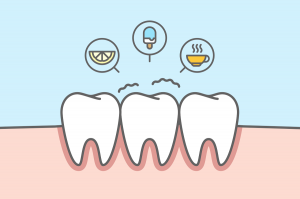
Have you ever taken a bite out of an ice cream cone or tried to sip a hot cup of coffee only to be met with a quick shooting pain in your tooth (or teeth)? Do you love lemons but can’t eat citrus fruits because of the pain it causes? If you’re nodding your head “yes” to these questions, you’re not alone. The American Dental Association estimates that nearly 40 million Americans have experienced some degree of tooth sensitivity. Ouch! The good news is that if you do have sensitive teeth, there are a few things you can do.
What is tooth sensitivity?
First, it’s important to pinpoint what is and what isn’t tooth sensitivity. Tooth sensitivity is not a general toothache, and it is not pain from chewing. Tooth sensitivity can be defined as:
-
Pain when eating acidic foods: Note that this is different than chewing. In the case of tooth sensitivity, it is the type of food that is problematic, not the actual act of chewing.
-
Pain when drinking cold beverages: iced coffee, iced tea, and even really cold water
-
Pain when drinking hot beverages: coffee, tea, or even hot broth and soups
-
Pain that can be described as sharp or shooting
What causes tooth sensitivity?
There are no at-risk groups for tooth sensitivity. The most common symptom is a sudden, sharp flash of pain when teeth are exposed to air, cold, sweet, acidic or hot foods. Some people may experience tooth sensitivity from brushing or flossing their teeth.
In healthy teeth, enamel protects the underlying layer of dentin, which is softer than enamel. The tooth roots are protected by gums. But if the enamel is worn down or if the gum line has receded, then the dentin becomes exposed. Cavities, cracked teeth, gum recession, enamel and root erosion all cause dentin to be exposed. Dentin is connected to the nerve that triggers pain in sensitive teeth. Dentin contains thousands of microscopic tubules, or channels, leading to the tooth’s pulp. When exposed to the elements, these dentinal tubules allow heat, cold, acidic or even sticky substances to reach the nerves inside the tooth, causing pain.
Some factors that contribute to sensitive teeth may include:
-
Brushing too hard or using a hard-bristled toothbrush. This can wear down enamel, causing dentin to become exposed, or encourage gum recession.
-
Gum recession. This often happens in people suffering from periodontal disease, and it exposes the dentin.
-
Gingivitis. Inflamed and sore gum tissue can result in exposure of the tooth’s root.
-
Cracked teeth. These can become filled with bacteria from plaque and cause inflammation in the pulp of the tooth. In more severe cases, it may lead to abscess and infection.
-
Teeth grinding or clenching. This can wear down enamel.
-
Plaque buildup.
-
Long-term use of mouthwash. Some over-the-counter mouthwashes contain acids. If dentin is exposed dentin, the acids can make existing tooth sensitivity worse and also further damage the dentin layer. There are neutral fluoride mouthwashes available that might be a better option.
-
Acidic foods. These can encourage enamel reduction.
-
Dental procedures. Teeth may be sensitive after professional cleaning, root planing, crown replacement and other tooth restoration procedures. Usually the pain will disappear in four to six weeks.
Treatment for Sensitive Teeth
The first and most important step in addressing tooth sensitivity is scheduling an appointment with your dentist to determine the cause of your sensitivity. Once you have a proper diagnosis, your dentist will be able to better guide you in ways to treat the sensitivity. For instance, if your tooth sensitivity is caused by a deep decay or cavity, the best solution addresses the decay.
Some of the common at-home treatments include:
-
Desensitizing toothpaste
-
Use a soft-bristled toothbrush
-
Avoid highly acidic foods
-
Use a fluoridated mouthwash daily
-
Avoid teeth grinding (consider getting a mouth guard)
-
Avoid or change teeth whitening agents
-
Less aggressive brushing habits
-
Avoid toothpastes containing Sodium pyrophosphate (typically used for tartar control)
Some dental procedures that may reduce tooth sensitivity:
-
Bonding, crowns or inlays. These may fix a tooth flaw or decay that is causing sensitivity.
-
Fluoride gel or varnish.
-
Surgical gum graft. This will protect the root and reduce sensitivity if the gum tissue has eroded from the root.
-
Root canal. This is a last-resort treatment for severe tooth sensitivity that has not been helped by other methods.
If your tooth sensitivity continues even after making lifestyle changes, it may be time to contact Exton Family Dentist to rule out other dental issues like cavities or gum disease.
Contact us today to book your appointment.
